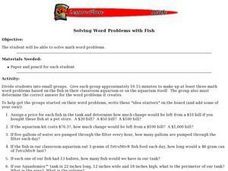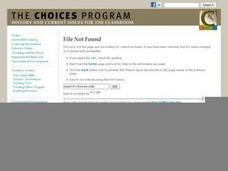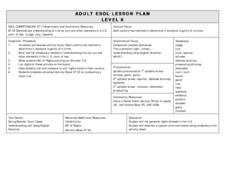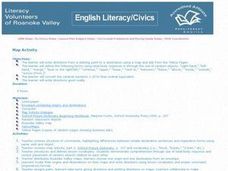Curated OER
Active Citizenship: The Civil Rights Work of Bob Moses
Students discuss and describe the impact of Bob Moses as an activist, compare and contrast the work of Bob Moses in the 1960's and today and develop an action plan regarding an issue they feel strongly about.
National Endowment for the Humanities
NAACP's Anti-Lynching Campaign in the 1930s
Students examine the anti-lynching campaign sponsored by the NAACP in the 1930's. In this social justice lesson, students study the history of the anti-lynching campaign and determine why it was not successful. Students conduct research...
Curated OER
Does the Supreme Court Affect Teens?: A Survey of Court Cases
Students read and restate the Ten Amendements of the Bill of Rights. They analyze Supreme Court cases using the Bill of Rights. Students make predictions about how the Supreme Court might have deicided each case. They evaluate how the...
Curated OER
Solving Word Problems with Fish
Send your class fishing...for the right answers! Small groups collaborate to create math word problems based on the fish in their classroom aquarium or on the aquarium itself. After all groups determine the answer for their ownproblem,...
C-SPAN
Presidential Veto and Congressional Override
One of the key powers of the executive branch is the president's ability to pass or veto legislation proposed by Congress. Congress, the legislative branch, on the other hand, can override a president's veto. Five film clips show how the...
Curated OER
My Secret War: Lesson 5
Fifth graders determine how freedom comes with rights and responsibilities through literature and poetry about World War II. In this World War II lesson, 5th graders use the letters in the word "infamy" to write an acrostic poem. They...
Curated OER
Lesson Two: The Federalist Papers
Students identify Articles of Confederation and explain why it failed, explain argument over need for Bill of Rights in Constitution and James Madison's role in securing it's adoption, and compare and contrast ideas of Federalists and...
Curated OER
How a Bill Becomes a Law
Students examine Article I, Sections 1, 7, and 8, of the U.S. Constitution and discuss the authority and restrictions placed on the Congress in making laws.
Curated OER
The Development of Antitrust Enforcement
Students analyze antitrust enforcement. In this American economics lesson plan, students listen to their instructor present a lecture regarding the details of the free market system and antitrust laws. Students respond to discussion...
Curated OER
You Be the Judge
Students research and evaluate a case considered by the U.S. Supreme Court regarding the jurisdiction of the Clean Water Act. They watch a Bill Moyers video, conduct a debate, and write about the decision they would make if they were a...
Curated OER
Whose God?
Students investigate religious freedom in the U.S. They watch and discuss a Bill Moyers NOW video, take a Freedom of Religion quiz, write an essay, and participate in a mock trial and debate.
Curated OER
Judges in the Classroom Lesson Plan Classifying Rights From Various Constitutions
Fourth graders compare the constitutions of five Pacific Rim countries. In this constitution comparison lesson, 4th graders work with a visiting judge to find similarities and differences in the constitutions of five countries. They...
Curated OER
A Salute to Veterans
Middle schoolers examine the United States Constitution. They prepare a skit dealing with the Bill of Rights. They practice being responsible citizens and becoming involved in the community.
Curated OER
How Does the USA Patriot Act Approach Race?
Students define and discuss the definitions of race and terrorism as a class. Using the Patriot Act, they analyze it and identify how it is a response to terrorism. They discuss how the documents could be viewed as one that supports...
Curated OER
Navigating The Legal System
Young scholars identify personal rights allowed under the law in the United States. An exploration of the legal process leads students to describe how the American legal system works. This lesson is intended for young scholars acquiring...
Curated OER
Family Law: Parent - Child Relationship
Students examine the role courts play in family matters and children's rights. They propose a court-ordered plan to resolve conflicts between parents/guardians and children. Students complete worksheets with various scenarios and discuss...
Curated OER
My Secret War: The WWII Diary of Madeline Beck: Lesson 6
Fifth graders explore women's rights by discussing the events of WWII. In this American work force lesson, 5th graders identify the events that led to World War II and how women helped fight the war through non-violent efforts. Students...
Curated OER
VA Statute for Religious Freedom, III
Students analyze the Virginia Statute for Religious Freedoms and consider its implications. In this governing principles lesson, students explore primary and secondary sources regarding the document penned by Thomas Jefferson.
Curated OER
Constitution Cartoons
Young scholars view series of cartoon overheads that explain Constitution, name branches of government and their powers, define federalism and separation of powers, examine rights and obligations of citizens, and discuss significance of...
Curated OER
Lesson Plan for Reading
Students in an adult ESL classroom are introduced to the definition of freedom of speech. Using the internet, they discover the differences between the rule of law and rule of men. To end the lesson, they examine how the court system...
Curated OER
A Civic Duty to Protest
Students examine the concept of religious freedom by evaluating Hong Kong's security laws. In pairs students investigate the levels of religous freedom allowed in various countries around the world and present this information to the class.
Curated OER
Money Talks
Students examine paper money from the time of the American Revolution. They use the issue dates of the bills to construct a chronology of political changes during the Revolution.
Curated OER
Map Activity - Roanoke Valley
Students write directions from a starting point to a destination using a map and ads from the Yellow Pages. They define the following terms using total body response or through the use of random objects: "right-hand," "left-hand,"...
Curated OER
Freedom of Expression in Special Places
Young scholars analyze the judicial decision making process, and identify three places presenting First Amendment problems. They analyze how the 1st Amendment applies to school newspapers, and argue for and against limiting 1st Amendment...

























